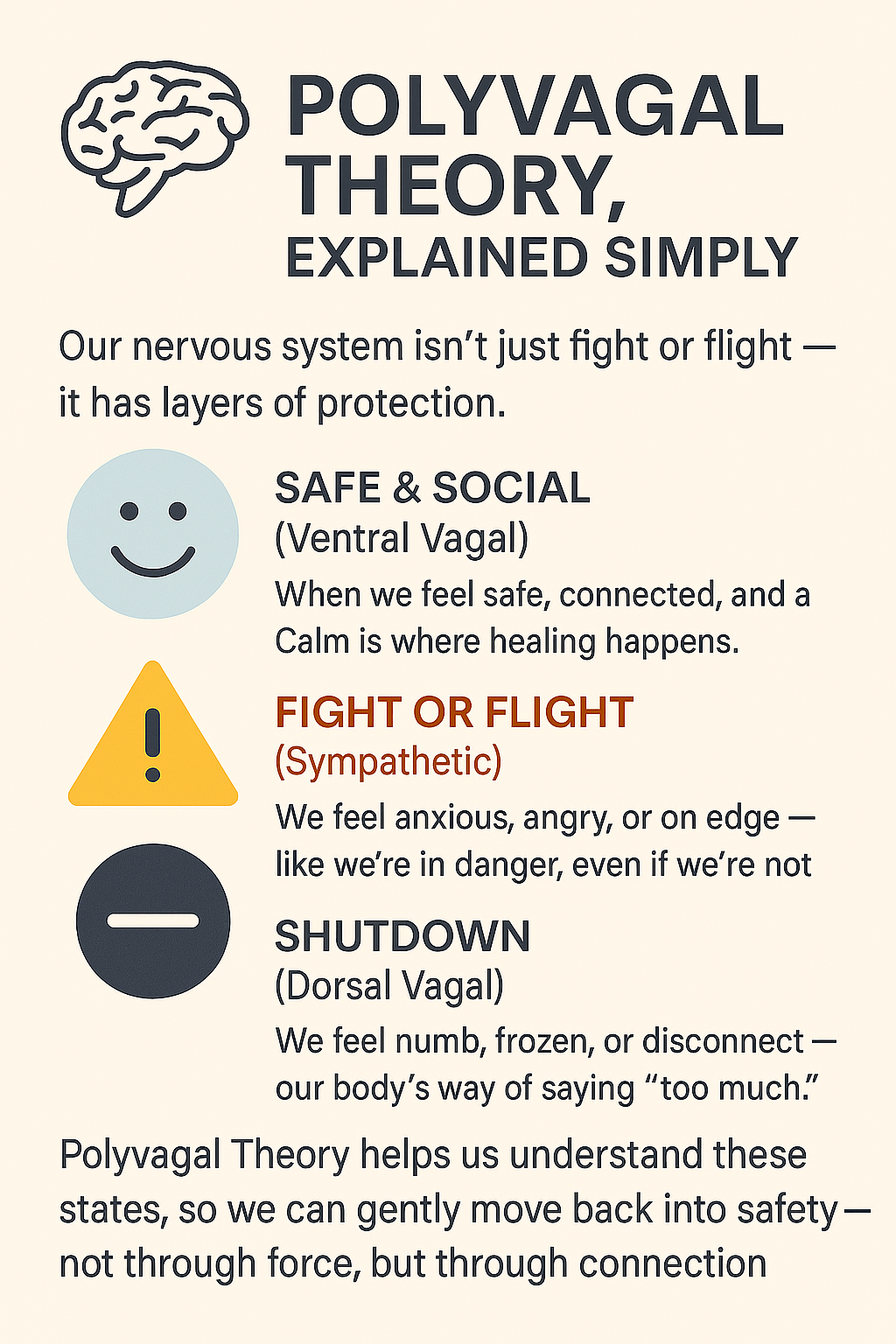
Why We Want Therapy… and Also Sometimes Don’t
Many people want the benefits of therapy but still feel the urge to avoid sessions. This push-pull is often driven by protective parts—old survival strategies that surface when healing work feels vulnerable. Learn why resistance shows up, how it’s actually a form of self-protection, and how trauma-informed therapy and EMDR help these parts feel safe enough to heal.

Understanding the Vagus Nerve: A Trauma Therapist’s Guide to Nervous System Healing
The vagus nerve plays a key role in calming the nervous system and supporting trauma healing. When activated, it helps the body shift out of fight-or-flight and into rest-and-digest. Trauma can disrupt vagal function, leaving many people stuck in survival mode. Simple vagus nerve exercises — such as slow breathing with long exhales, humming or singing, gentle massage, rhythmic movement, safe social connection, and experimenting with cold or warmth — can reduce anxiety, improve regulation, and restore a sense of safety. These trauma-informed tools offer natural ways to support the nervous system and strengthen resilience.

What Does Trauma Look Like When It’s Not Obvious?
What does trauma look like when it’s not obvious? Learn how subtle trauma symptoms—like perfectionism, people-pleasing, and numbness—can affect daily life, and how trauma therapy can help.

Healing Through Play: How Polyvagal Theory Explains the Power of Safety and Connection
Play is more than fun—it’s healing. Explore how polyvagal theory shows play helps trauma survivors restore safety, connection, and regulation.

7 Red Flags: Are You Dating a Narcissist?
Wondering if you’re dating a narcissist? Learn the 7 early red flags—like love bombing, gaslighting, and blame shifting—that often escalate in relationships. Plus, what to do if you notice these signs and how therapy can help with narcissistic abuse recovery.

Why Do I Compare Myself to Others on Social Media?
Struggling with comparison on social media? Learn why we compare, how it impacts mental health, and simple shifts to stop feeling “behind” and refocus on your own healing path.

Why Do I Over-Apologize—and How Can I Fix It?
Over-apologizing is more than just a habit—it’s often a survival strategy rooted in trauma, people-pleasing, or anxiety. Many learn to say “sorry” constantly to avoid conflict, rejection, or punishment, but over time it can shrink your self-worth and weaken genuine apologies. In this blog, therapist Michelle Nosrati, LCSW explores why we over-apologize, how it impacts relationships and self-esteem, and practical tools to shift the pattern. From replacing apologies with gratitude (“Thank you for waiting”) to therapies like EMDR that reprocess the root causes, healing is possible. Learn how to stop over-apologizing and reclaim your voice.

Why Do I Keep Dissociating? Understanding a Common Trauma Response
Feeling disconnected, foggy, or numb? Dissociation is a common trauma response—not a flaw. Learn why it happens, how it protects you, and how EMDR therapy can help you reconnect with your body, emotions, and sense of safety.

Is Trauma Behind Your Autoimmune Symptoms? Here’s What to Know
Discover how trauma, chronic stress, and nervous system dysregulation can trigger autoimmune illness—and how EMDR therapy can support long-term healing.

EMDR and Repressed Memories: What You Need to Know About Memory Recovery in Trauma Therapy
Curious about how EMDR therapy works with repressed or forgotten memories? Learn how EMDR can access suppressed trauma, what to expect in memory recovery, and how to approach it safely with a trauma-informed therapist.

What Happens After EMDR Therapy?Understanding the Effects, Integration, and Long-Term Healing
Wondering what to expect after EMDR therapy? Learn about common emotional and physical reactions, integration tips, and the long-term effects of EMDR on the brain—including how reprocessed memories lose their emotional charge over time.

Can EMDR Help Me Stop Getting Angry at My Kids?
Learn how EMDR therapy can help parents reduce anger, manage emotional reactivity, and expand their window of tolerance. This trauma-informed approach supports healing past wounds, regulating the nervous system, and shifting negative beliefs like “I’m a bad parent.” EMDR helps break generational patterns so parents can respond with more patience, presence, and self-compassion.

Can EMDR Help with ADHD?
Explore how EMDR therapy can support adults with ADHD by addressing underlying trauma, nervous system dysregulation, and negative self-beliefs. Learn how EMDR helps improve emotional regulation, reduce overwhelm, and shift internalized messages like “I’m lazy” or “something’s wrong with me.” This trauma-informed approach goes beyond symptom management to support lasting healing for ADHD and trauma.

When Celebrities Talk About EMDR—Why It Matters More Than You Think
Celebrities like Prince Harry, Sandra Bullock, Demi Lovato, and Jameela Jamil have publicly shared how EMDR therapy helped them heal from trauma, anxiety, and emotional reactivity. This blog explores what they gained—like emotional regulation, insight, and nervous system relief—and why their stories help destigmatize therapy. Learn how EMDR can support anyone, not just public figures, in breaking free from old patterns and finding long-term healing.

Why Do I Keep Dating Someone Who’s Married?
Struggling with a pattern of dating unavailable or married partners? Learn how past wounds, trauma, and EMDR therapy can help break the cycle.

Can EMDR Help with Anxiety?A Nervous System Approach to Lasting Relief
Struggling with anxiety that won’t go away, even after talk therapy? Learn how EMDR therapy helps heal anxiety at the root by targeting core beliefs, trauma, and nervous system dysregulation. Virtual EMDR sessions available in California and Nevada.

Can EMDR Therapy Be Done Online? Understanding the Effectiveness of Virtual EMDR
Wondering if EMDR therapy can be done online? Learn how virtual EMDR sessions work, the benefits of remote therapy, and why telehealth EMDR is a safe, effective option for trauma recovery in California and Nevada.

What Is Polyvagal Therapy? Understanding the Science of Safety and Healing
Learn how polyvagal therapy helps heal trauma by regulating the nervous system. Understand the vagus nerve, trauma responses like fight, flight, and freeze, and how polyvagal-informed therapy supports emotional safety and healing from complex PTSD.

We Heal in Connection: Why Community Matters After Complex Trauma
Healing from complex trauma requires more than individual therapy—it requires community. This blog explores how EMDR therapy, boundary setting, and support groups like ACA (Adult Children of Alcoholics and Dysfunctional Families) work together to help trauma survivors rebuild trust, emotional safety, and connection. Learn how combining EMDR with peer support can deepen healing from childhood emotional neglect, relational trauma, and narcissistic abuse.

Can EMDR Help with Depression? Exploring a Nervous System Approach to Healing
Struggling with depression that hasn’t improved with talk therapy or medication? Learn how EMDR therapy can help uncover and heal the deeper roots of depression by targeting trauma, negative beliefs, and nervous system dysregulation.

